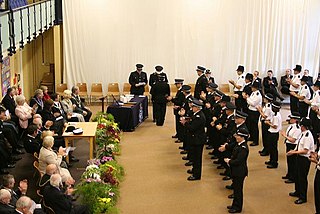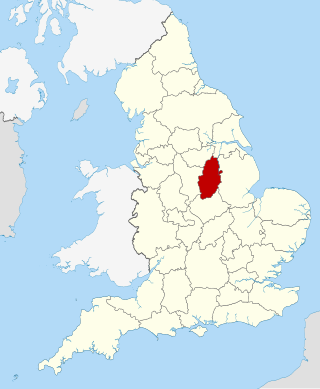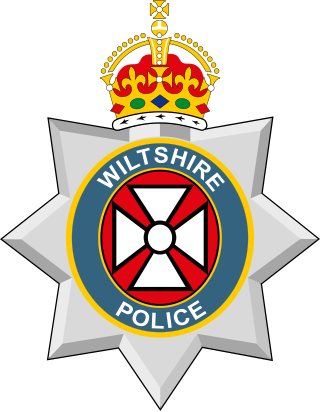This article needs additional citations for verification .(September 2017) |
A Police information point (PIP) is a staffed or unstaffed place of information about local policing that are run by British police forces for the benefit of local residents.
This article needs additional citations for verification .(September 2017) |
A Police information point (PIP) is a staffed or unstaffed place of information about local policing that are run by British police forces for the benefit of local residents.
Police Information Points were first introduced by Gloucestershire Police [1] in 2010 as a way of getting the public to interact with their local policing team. Today, unstaffed PIPs, (sometimes called Library Information Points), [2] are used by many police forces in the UK, and include such features as advice on crime reduction, details of the local Neighbourhood Policing Team and sometimes a message box for the local 'Beat Manager'. Staffed PIPs are run by police support volunteers (PSVs), who can direct people to local services, issue police forms to the public, receive and record lost and stolen property, and make appointments for visitors to speak to their neighbourhood officers. [3] [4]
Due to being staffed by volunteers, PIPs have limited opening hours of a few hours every few days.
Police information points are not to be confused with police enquiry desks, that are staffed by actual police officers. There are some tasks that PSVs aren't authorised to do, such as taking reports of crime, dealing with people reporting on bail, road traffic collisions and checking vehicle documents.

Wiltshire is a historic and ceremonial county in South West England with an area of 3,485 km2. It is landlocked and borders the counties of Dorset to the southwest, Somerset to the west, Hampshire to the southeast, Gloucestershire to the north, Oxfordshire to the northeast and Berkshire to the east. The county town was originally Wilton, after which the county is named, but Wiltshire Council is now based in the county town of Trowbridge. Within the ceremonial county's boundary are two unitary authority areas, Wiltshire and Swindon, governed respectively by Wiltshire Council and Swindon Borough Council.

Thames Valley Police is the territorial police force responsible for policing the Thames Valley, covering the counties of Berkshire, Buckinghamshire and Oxfordshire. It the largest non-metropolitan police force in England and Wales, covering 2,218 square miles (5,740 km2) and a population of 2.42 million people.

Law enforcement in the United Kingdom is organised separately in each of the legal systems of the United Kingdom: England and Wales, Northern Ireland and Scotland. Most law enforcement is carried out by police officers serving in regional police services within one of those jurisdictions. These regional services are complemented by UK-wide agencies, such as the National Crime Agency and the national specialist units of certain territorial police forces, such as the Specialist Operations directorate of the Metropolitan Police.

The Special Constabulary is the part-time volunteer section of statutory police forces in the United Kingdom and some Crown dependencies. Its officers are known as special constables.

West Midlands Police is the territorial police force responsible for policing the metropolitan county of West Midlands in England.

Avon and Somerset Police is the territorial police force responsible for law enforcement in the five unitary authority areas of Bristol, Bath and North East Somerset, North Somerset, Somerset, and South Gloucestershire in South West England.

Gwent Police is a territorial police force in Wales, responsible for policing the local authority areas of Blaenau Gwent, Caerphilly, Monmouthshire, Newport and Torfaen.

Warwickshire Police is the territorial police force responsible for policing Warwickshire in England. It is the second smallest territorial police force in England and Wales after the City of London Police, with only 823 regular officers as of September 2017. The resident population of the force area is 554,002.

Dorset Police is the territorial police force responsible for policing the county of Dorset in South West England, which includes the largely rural area covered by Dorset Council, and the urban conurbation of Bournemouth, Christchurch and Poole.

Durham Constabulary is the territorial police force responsible for policing the council areas of County Durham and Darlington in North East England. It does not cover all of the ceremonial or historic area of Durham, parts of which are covered by the neighbouring forces of Cleveland Police and Northumbria Police. The other neighbouring forces are Cumbria Constabulary to the west and North Yorkshire Police to the south.

Gloucestershire Constabulary is the territorial police force responsible for policing the non-metropolitan county of Gloucestershire in South West England.

The Hampshire and Isle of Wight Constabulary is the territorial police force responsible for policing the counties of Hampshire and the Isle of Wight in South East England.

Sussex Police is the territorial police force responsible for policing in the whole of Sussex. Its jurisdiction covers the ceremonial counties of East Sussex and West Sussex. The force is headquartered in Malling House, Lewes, East Sussex.

Nottinghamshire Police is the territorial police force responsible for policing the shire county of Nottinghamshire and the unitary authority of Nottingham in the East Midlands area of England. The area has a population of just over 1 million.

Staffordshire Police is the territorial police force responsible for policing Staffordshire and Stoke-on-Trent in the West Midlands of England. It is made up of 11 local policing teams, whose boundaries are matched to the nine local authorities within Staffordshire.

Wiltshire Police, formerly known as Wiltshire Constabulary, is the territorial police force responsible for policing the county of Wiltshire in South West England.
Police Support Volunteer is a voluntary role within the ranks of British Police Forces that involves civilian and mainly office based duties. PSV schemes became popular after 2000 when forces were expanding and needed to be more connected to the community. At the start few forces had a civilian volunteer scheme but by 2010, 32 of the 43 police forces have PSV schemes. In the UK there are over 6,250 volunteers, who contribute over 500,000 hours a year voluntarily. It is estimated that the number of PSV's will increase by 70% next year to over 10,000 volunteers. The first PSV scheme was started in 1992 by Kent Police.
Policing in the English county of Wiltshire (including the borough of Swindon) is the responsibility of several civilian and military authorities.

Wales is served by four police forces, Dyfed–Powys Police, Gwent Police, North Wales Police and South Wales Police.